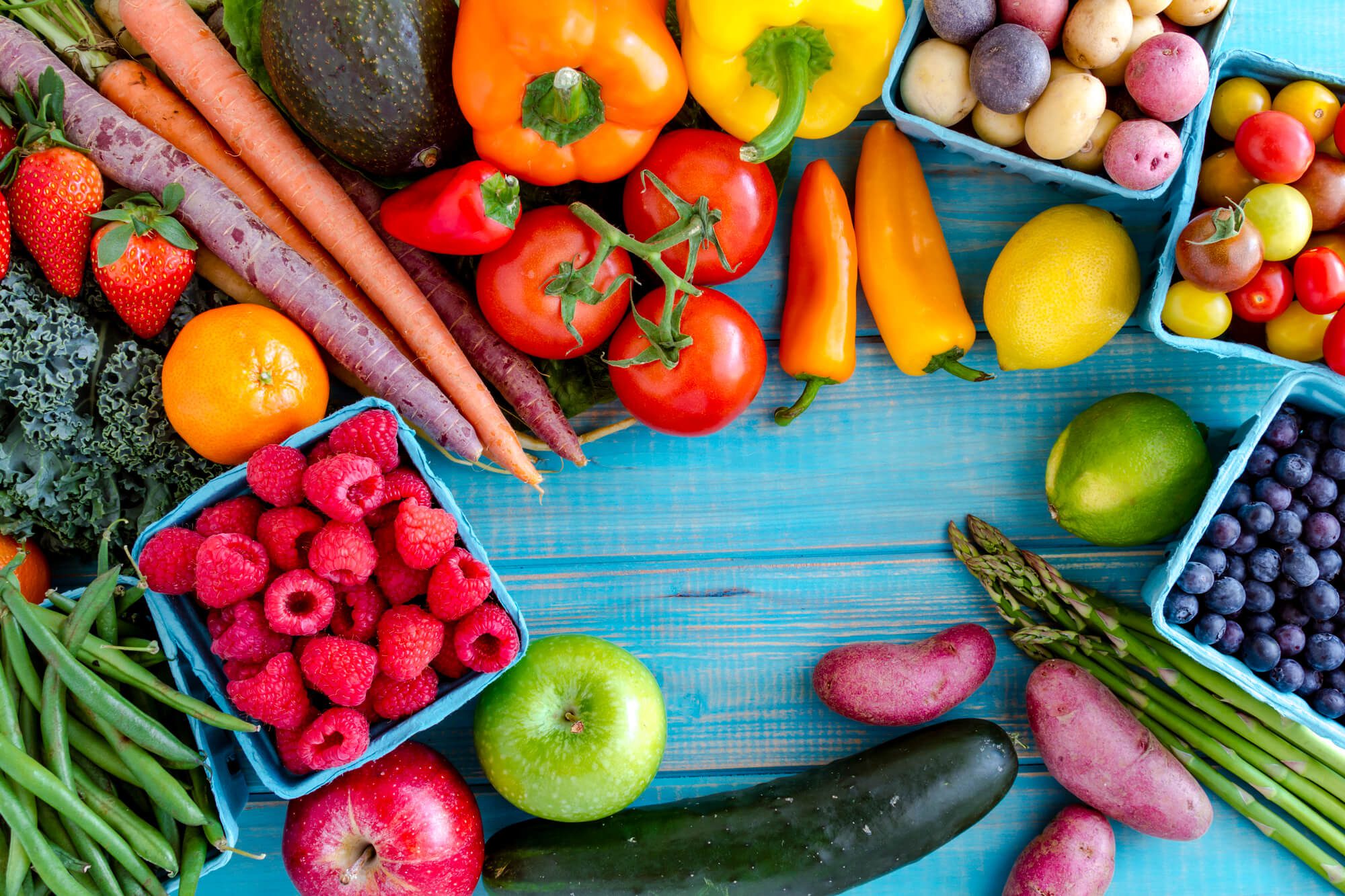Everything About Healthy And Balanced Food: Advantages of Taking On Plant Based Alternatives
The conversation surrounding plant-based diet plans has obtained considerable attention in recent years. Lots of individuals are exploring the prospective health and wellness benefits, nutritional advantages, and ecological influences associated with these dietary options. As individuals become much more knowledgeable about their food's impact on wellness and sustainability, questions emerge concerning the functionalities of taking on such a lifestyle. What particular modifications can one expect, and how might these choices improve not just personal health and wellness but also the earth's future?
Comprehending Plant-Based Diet Regimens
Many individuals associate plant-based diet plans generally with vegetarianism or veganism, these diets can incorporate a large range of consuming patterns that focus on whole, minimally refined plant foods. Such diet plans commonly consist of fruits, vegetables, entire grains, beans, seeds, and nuts, while removing or restricting pet products. This versatility permits people to tailor their dietary choices according to dietary demands and personal choices. Some might embrace a primarily plant-based diet while still periodically consuming meat or dairy products, often referred to as a flexitarian technique. The focus continues to be on incorporating even more plant foods, which can cause a varied array of dishes and flavors. Recognizing these various analyses of plant-based eating is crucial for appreciating its access and charm in modern food society.
Health Conveniences of Plant-Based Foods
The health benefits of plant-based foods are substantial, using a nutrient thickness advantage that supports general wellness. Research study suggests that these foods can enhance heart health and wellness and play a crucial duty in efficient weight management. By integrating more plant-based alternatives, individuals may boost their nutritional selections and advertise lasting health.
Nutrient Density Benefit
Nutrient thickness plays a crucial role in the health and wellness benefits of plant-based foods, making them a compelling choice for those seeking a well balanced diet plan. Plant-based foods, such as fruits, vegetables, beans, nuts, and entire grains, are commonly rich in crucial vitamins, minerals, and anti-oxidants while being lower in calories. This high nutrient thickness permits individuals to consume fewer calories while still meeting their nutritional requirements. Furthermore, these foods are loaded with dietary fiber, promoting digestion health and helping in weight monitoring. By incorporating nutrient-dense plant-based alternatives, consumers can boost their total wellness, sustain their body immune systems, and reduce the threat of chronic conditions. Eventually, the nutrient thickness of plant-based foods emphasizes their value in a health-conscious way of living.
Heart Health And Wellness Renovation

Weight Administration Assistance
Along with promoting heart health and wellness, a plant-based diet can significantly assist in weight administration. This dietary strategy emphasizes whole foods such as fruits, vegetables, vegetables, nuts, and whole grains, which are usually reduced in calories and higher in fiber contrasted to animal-based items. The high fiber content aids raise satiety, lowering general calorie consumption. In addition, plant-based diet regimens are commonly rich in important nutrients while reduced in unhealthy fats, making it less complicated to preserve a healthy and balanced weight. Sugar Free Sauces. Study indicates that people that embrace a plant-based lifestyle tend to have reduced body mass indexes (BMIs) and experience even more effective weight loss compared to those that eat meat-heavy diet regimens. Embracing plant-based choices is a tactical selection for efficient weight management.
Nutritional Value of Plant-Based Ingredients
Plant-based components are rich in important nutrients, providing a varied selection of vitamins, minerals, and anti-oxidants that contribute to total wellness. A comparison of protein sources discloses that while pet items are usually deemed premium, numerous plant-based choices provide adequate protein and other helpful substances. Understanding the dietary worth of these ingredients can help individuals make informed dietary options.
Important Nutrients in Plants
Nutrient-rich ingredients located in plants offer a varied variety of crucial vitamins and minerals that contribute significantly to overall wellness. These ingredients are rich in vitamins A, C, and K, which sustain immune feature, vision, and blood clot, specifically. On top of that, plants supply crucial minerals such as potassium, magnesium, and calcium, critical for heart wellness, muscle function, and bone stamina. The visibility of fiber in plant-based foods help food digestion and promotes a healthy and balanced intestine microbiome. Anti-oxidants, found abundantly in veggies and fruits, help battle oxidative stress and minimize inflammation. Lots of plant foods are reduced in calories yet high in nutrients, making them an outstanding choice for those looking for to keep a healthy and balanced weight while guaranteeing suitable nutrient intake.

Contrasting Protein Sources
Healthy protein sources differ significantly in their dietary profiles, with plant-based active ingredients providing distinct advantages. Unlike pet healthy proteins, why not check here which often consist of saturated fats and cholesterol, plant healthy proteins have a tendency to be reduced in these undesirable elements. Legumes, nuts, seeds, and entire grains are rich in essential amino acids, fiber, vitamins, and minerals. Lentils supply high healthy protein web content along with significant iron and folate, while quinoa is a full healthy protein, offering all 9 crucial amino acids. In addition, plant-based proteins are typically accompanied by anti-oxidants and phytochemicals that support total health. The shift to plant-based protein resources not only enhances dietary intake but likewise aligns with lasting nutritional techniques, minimizing ecological effect and advertising long-lasting wellness benefits.
Ecological Effect of Plant-Based Eating
As understanding of environment adjustment expands, several people are discovering lasting nutritional selections that can greatly minimize their environmental footprint. Plant-based eating has emerged as a substantial factor to minimizing greenhouse gas discharges, which are largely connected with livestock production. The cultivation of fruits, legumes, grains, and veggies normally requires less sources, such as water and land, contrasted to animal farming. Additionally, plant-based diets can cause reduced logging, as less land is needed for grazing livestock or expanding pet feed. By shifting towards plant-based options, consumers can sustain biodiversity and advertise healthier ecosystems. In general, welcoming plant-based eating not just advantages personal health and wellness however also represents an essential action towards environmental sustainability and conservation initiatives.
Overcoming Common Misconceptions
While lots of individuals identify the benefits of a plant-based diet, a number of mistaken beliefs frequently discourage them from totally embracing this way of living. A common belief is that plant-based diets lack sufficient healthy protein; nonetheless, countless plant resources, such as vegetables, nuts, and tofu, provide enough protein. In addition, some think that this diet plan is expensive, when in fact, staples like beans, rice, and seasonal vegetables can be quite inexpensive. An additional misconception is that plant-based consuming is overly limiting, whereas it in fact offers a diverse selection of foods and tastes. Lastly, several worry that a plant-based diet may cause shortages, yet with correct preparation, people can acquire all essential nutrients, including minerals and vitamins, while appreciating a variety of tasty meals.
Tips for Transitioning to a Plant-Based Way of life
Making the change to a plant-based way of life can be an improving experience, though it often requires some advice to navigate the preliminary adjustments. First, individuals are urged to begin progressively, integrating more fruits, veggies, legumes, and entire grains right into their meals while minimizing meat and dairy consumption. Meal planning is vital; preparing a weekly food selection can assist alleviate the change and stop final unhealthy options. Checking out brand-new recipes and cooking approaches can likewise enhance the experience and keep enjoyment regarding plant-based eating. Furthermore, signing up with support system or neighborhoods can give motivation and share beneficial tips. Staying notified regarding nutrition assurances balanced dishes, protecting against deficiencies while cultivating a healthy, gratifying plant-based lifestyle.

Delicious Plant-Based Meal Concepts
Exploring scrumptious plant-based dish concepts can influence people to embrace a much more nourishing diet. One preferred option is a hearty quinoa salad, including cherry tomatoes, cucumber, and a spicy lemon-tahini dressing. Another favorite is a mouthwatering lentil stew, packed with carrots, celery, and fragrant natural herbs, excellent for a soothing dinner. For morning meal, over night oats made with almond milk, chia seeds, and topped with fresh berries give a nourishing start to the day. In addition, a dynamic vegetable stir-fry with tofu and a range of vivid veggies Visit Your URL can be a fast yet satisfying dish. Finally, luscious avocado toast on whole-grain bread, sprinkled with flavors and seeds, uses a basic yet tasty snack. These dishes showcase the variety and richness of plant-based eating.

Frequently Asked Inquiries
Can a Plant-Based Diet Regimen Offer Sufficient Protein?
The inquiry of whether a plant-based diet plan can provide sufficient protein is typical. Countless sources, including vegetables, nuts, seeds, and entire grains, can satisfy protein requires successfully, supporting a nutritious and balanced diet plan for people.
Are Plant-Based Diet Plans Suitable for Kid?
The viability of plant-based diets for kids relies on mindful planning. Adequate nutrients should be guaranteed, consisting of proteins, vitamins, and minerals. With correct support, such diet regimens can sustain healthy growth and advancement in youngsters.
How Do I Eat in restaurants on a Plant-Based Diet?
Eating out on a plant-based diet plan includes seeking restaurants with varied food selections, requesting adjustments, and checking out vegan-friendly options. Planning ahead and connecting dietary preferences can improve the dining experience while keeping nutritional choices.
What Prevail Irritants in Plant-Based Foods?
Typical allergens in plant-based foods consist of soy, gluten, nuts, and seeds - Gluten Free BBQ Sauce. Individuals complying with a plant-based diet must be conscious of these irritants and read tags thoroughly to stay clear of unfavorable reactions web link and guarantee risk-free usage
Can Plant-Based Diets Assist With Fat Burning?
Research study indicates that taking on a plant-based diet regimen may help with weight management as a result of its usually reduced calorie thickness and higher fiber content. This combination can improve satiety, aiding people handle their calorie intake properly. Many people link plant-based diet regimens primarily with vegetarianism or veganism, these diets can encompass a wide variety of consuming patterns that focus on whole, minimally processed plant foods. Nutrient thickness plays a vital duty in the wellness advantages of plant-based foods, making them an engaging selection for those looking for a well balanced diet plan. Plant-based diets have actually been revealed to noticeably improve heart health and wellness, as they typically include elements that sustain cardio function. In enhancement to promoting heart health and wellness, a plant-based diet can considerably help in weight monitoring. A common idea is that plant-based diet regimens do not have adequate protein; nevertheless, countless plant sources, such as legumes, nuts, and tofu, offer sufficient protein.
Comments on “Are Sugar Free Sauces Actually Healthy? A Breakdown for Plant-Based Eaters”